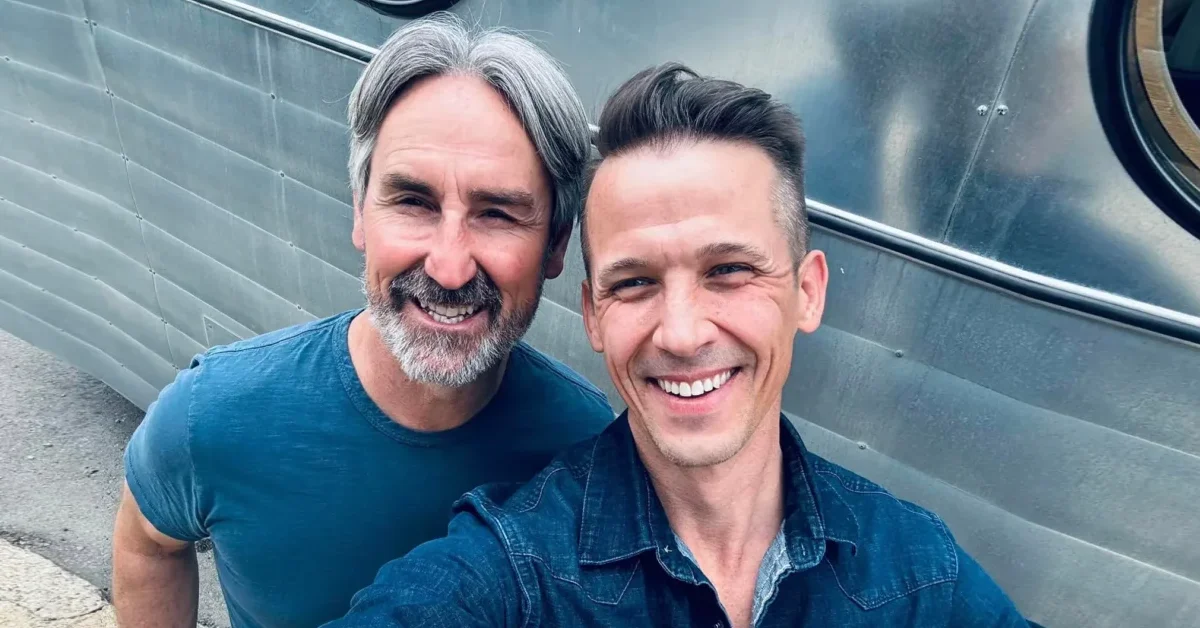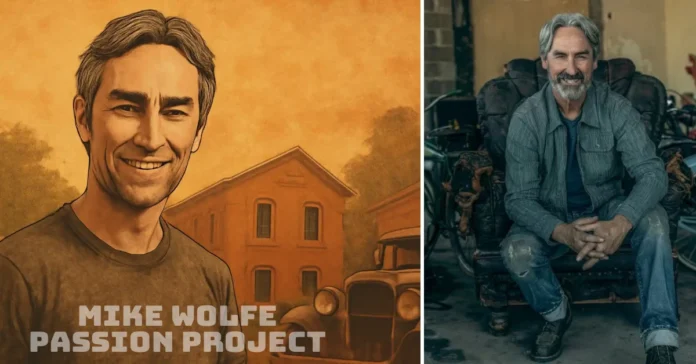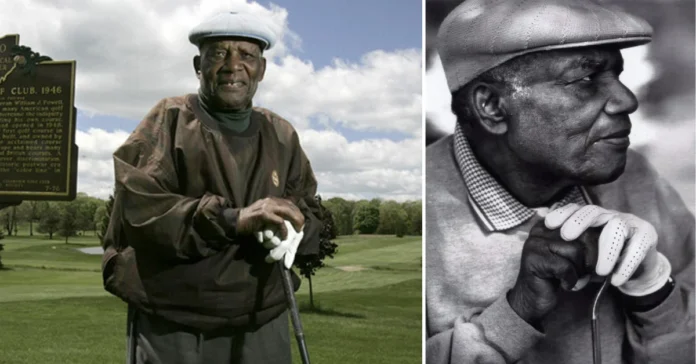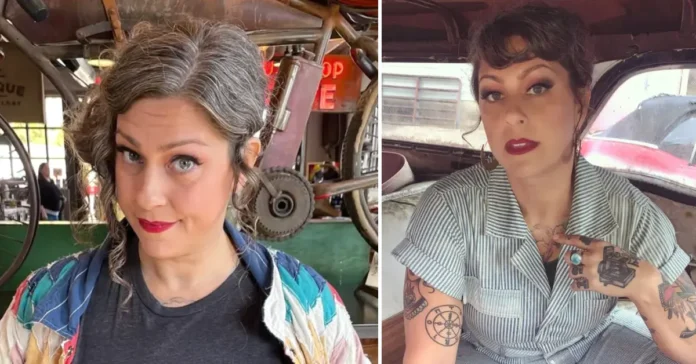Mike Wolfe’s passion project centers on preserving historic buildings and revitalizing Columbia, Tennessee. With support from partner Leticia Cline, he transforms abandoned structures into community spaces that boost local businesses through heritage tourism and adaptive reuse.
Global heritage tourism reached $604.38 billion in 2024. Mike Wolfe, star of American Pickers, is showing that small towns can benefit from this trend. Along with former co-stars Frank Fritz and Danielle Colby, and preservation expert Bill Powell, Wolfe now leads restorations that preserve history while stimulating local economies.
Wolfe’s project transforms neglected buildings into vibrant community hubs, generates measurable economic impact, and provides a clear model for revitalizing small towns across the U.S.
What Is Mike Wolfe’s Passion Project
Mike Wolfe’s Passion Project emerged from a desire to move beyond collecting objects. While antiques fascinated him, Wolfe realized that the true treasures lay in the stories and places connected to them. His initiative evolved into a broader mission: protecting historic buildings, preserving small-town architecture, and supporting the craftsmen and communities that give these places their meaning.
The main ideas of the project can be grouped into a few simple points: Historic Preservation – saving and restoring old buildings. Community Revitalization – turning empty or broken spaces into useful ones. Storytelling – keeping alive the stories connected to places and objects. Support for Makers – giving space and attention to local artists and craftspeople.
Unlike traditional real estate flipping, Wolfe’s approach prioritizes historical integrity and community benefit over maximum profit. Instead of tearing down old structures, he advocates for reimagining them as assets. This approach not only saves history but also provides opportunities for local businesses and tourism.
The project runs on four fronts: restoring buildings, supporting local artisans, documenting stories via the Two Lanes platform, and creating gathering spaces. Experts like Bill Powell collaborate with Wolfe to ensure authentic restorations.
Columbia, Tennessee, Becomes Preservation Laboratory
Columbia, Tennessee, serves as the primary location for Mike Wolfe’s passion project. This charming Southern town captured Wolfe’s attention with its collection of well-preserved 19th and early 20th-century architecture, much of which was at risk of deterioration.
Wolfe has invested significantly in Columbia’s downtown corridor. Mike bought a former Chevrolet dealership that he named Columbia Motor Alley. The property was bought in November 2017 for $400,000 and has an estimated value of $717,400. The building is a whopping 13,440 square feet.
Wolfe owns multiple properties, including a $1 million home in Leipers Fork, previously shared with ex-wife Jodi Faeth, and several properties in his hometown of Le Claire, Iowa. His portfolio totals roughly $5 million.
His restoration work extends beyond single buildings. Having purchased the property in 2022 for $600,000, he has invested an additional $38,000 in upgrades, adding a pergola, firepit, and stage. This demonstrates his commitment to creating complete environments rather than just renovating individual structures.
The scope of Wolfe’s Columbia investments reflects a systematic approach to downtown revitalization, with each project designed to complement others and create a cohesive heritage district.
Economic Impact of Historic Preservation
PlaceEconomics reports that in the U.S., 100 jobs in new construction generate 135 additional jobs elsewhere, while 100 rehabilitation jobs create 186. This underscores the economic power of preservation.
Spending from heritage tourists in FY 2023 averaged $336.24 per person per overnight trip, which is dispersed between local hotels, restaurants, shops, and other small businesses. This data supports Wolfe’s strategy of creating heritage destinations that attract tourists and generate sustained economic activity.
The U.S. heritage tourism market generated a revenue of USD 125,276.8 million in 2023 and is expected to reach USD 162,460.6 million by 2030. Small towns like Columbia can capture portions of this growing market through strategic preservation efforts.
Research consistently shows preservation projects deliver superior economic returns compared to new construction. In Nashville, the firm found that 40% of job growth occurred in its historic districts compared to 9% in the rest of the city. This data validates Wolfe’s focus on downtown historic areas as catalysts for broader economic development.
The multiplier effect extends beyond direct tourism spending. One way Main Street stakeholders pursue community revitalization is through restoring buildings, which conveys a sense of pride in the area and can have a positive ripple effect on investment by other property owners.
From Gas Station to Community Hub
On May 28, the 60-year-old History Channel star shared on Instagram the transformation of an old gas station into a vibrant community space. The Revival project demonstrates Wolfe’s adaptive reuse approach, a philosophy championed by partner Leticia Cline, who emphasizes community-focused design.
The transformed space, now christened “Revival,” is a perfect case study in adaptive reuse. The historic facade and architectural integrity of the gas station were preserved. That’s non-negotiable. You keep the soul of the structure. The purpose is completely reimagined. Instead of pumping gas, it will now serve food and craft cocktails.
The design incorporates elements that foster community interaction. The addition of outdoor seating and a central fire pit is a masterstroke. It transforms a transactional space (a gas station or a restaurant) into an experiential one. It’s no longer just a place to stop; it’s a place to stay. A place to connect.

This approach demonstrates how historic preservation can create “third places” – social spaces between home and work where community members gather informally. Wolfe’s restored buildings often serve this function, providing venues for community events, meetings, and celebrations.
The Revival project required careful coordination with preservation specialists. “When I purchased this Esso station in downtown Columbia, TN, I knew that I was going to need a company that could match my passion and bring this place to life,” Wolfe captioned his update.
Mike Wolfe’s Broader Restoration Portfolio
Beyond Columbia, Wolfe maintains restoration projects across multiple states. Wolfe’s Antique Archaeology stores in LeClaire, Iowa, and Nashville, Tennessee, are more than retail spaces. They serve as living museums, where each item is displayed with its backstory.
Preservation expert Bill Powell has spent nearly 50 years restoring 75 historic buildings in Franklin, including White’s Mercantile and the old fire rescue building. Wolfe partners with Powell to ensure every restoration maintains historical authenticity.
His Two Lanes platform serves as both a documentation tool and a marketing vehicle. Part travelogue, part time capsule, it’s where he posts grainy 35mm photos of forgotten motels, interviews saddle-makers in Texas, and drops limited-run merch. The site’s traffic jumped 220% in the last six months, proving people crave the slow, analog stories Two Lanes delivers daily.
Every quarter, Mike quietly wires micro-grants ($2k–$10k) to small-town artisans—blacksmiths, sign painters, neon benders—so the skills that built America don’t blink out. This support system extends his impact beyond physical buildings to include preserving traditional craftsmanship.
Response and Challenges
Not all residents embrace Wolfe’s transformation efforts. The residents of Columbia, Tennessee, are admittedly divided over all the changes and business growth the History Channel star has brought to the “mule capital of the world.”
Citizens of the community remain divided on Wolfe’s investments and upgrades in Columbia. Some admire his dedication to restoring and revitalizing the town, while others question the impact of these changes on its character. These concerns reflect common tensions between preservation and gentrification.
“It’s kind of interesting because a lot of people don’t want change, and some people do, so we’re in that flux,” a town source said of Mike bringing business to Columbia. This honest assessment captures the complexity of community revitalization efforts.
Some residents worry about maintaining Columbia’s quiet, small-town character as tourist traffic increases. The TV personality bought a former Chevrolet dealership that he named Columbia Motor Alley. The property was purchased in November 2017 for $400,000 and has an estimated value of $717,400. Rapid property value increases can price out longtime residents.
However, supporters point to tangible benefits, including increased business activity, job creation, and renewed civic pride. The challenge lies in balancing growth with affordability and maintaining authentic community character.
Heritage Tourism Drives Local Economy
The University of Texas and Rutgers University conservatively estimate that 10.5 percent of travel to Texas is categorized as heritage tourism. While this data comes from Texas, it illustrates the broader potential for states to capture heritage tourism dollars.
In 2024, 56% of all travel was focused on cultural heritage. This number is expected to grow as more travelers seek deeper, more meaningful experiences to learn about history, art, and traditions. Wolfe’s projects position Columbia to capitalize on this trend.
Travelers aged 51 to 70 captured a market share of 58.42% in 2024, reflecting the heightened interest in culturally enriching and educational travel experiences among this demographic. This age group typically has both disposable income and time for extended heritage tourism visits.
The economic multiplier effect of heritage tourism extends throughout local economies. Research has proven that “heritage tourists,” or those who visit to focus on a place’s history, bring greater value to a community than visitors for other purposes.
Historic preservation attracts heritage tourism by protecting the historic sites, architectural details, and stories that draw in heritage tourists. Wolfe’s storytelling approach through Two Lanes creates the narrative context that heritage tourists seek.
FAQs
What is Mike Wolfe’s passion project?
Mike Wolfe’s passion project focuses on historic preservation, community revitalization, and supporting local artisans through building restoration and storytelling.
Where is Mike Wolfe’s passion project located?
Columbia, Tennessee, serves as the primary location, though he also has projects in LeClaire, Iowa, and Franklin, Tennessee.
How much has Mike Wolfe invested in Columbia?
Mike has a real estate empire of around $5 million with properties in Tennessee and Iowa.
What is Revival in Columbia, Tennessee?
Revival is a restored gas station transformed into a dining and drinking establishment with outdoor seating and a central fire pit.
Does historic preservation really help local economies?
Yes, for every 100 jobs in rehabilitation, 186 jobs are created elsewhere in the economy, compared to 135 for new construction.
When did Mike Wolfe start his Columbia projects?
Wolfe began investing in Columbia in November 2017 with his purchase of Columbia Motor Alley, followed by additional properties through 2022.
| Project | Purchase Price | Current Value | Purpose |
|---|---|---|---|
| Columbia Motor Alley | $400,000 | $717,400 | Automotive heritage/events |
| Revival (Esso Station) | $600,000 | $600,000+ | Restaurant/community space |
| Two Lanes Building | $464,400 | $464,400+ | Vacation rental/bike shop |
| Historic Home | $700,000 | $700,000+ | Private restoration |
Mike Wolfe’s passion project proves that preserving the past creates vibrant futures. Google Trends shows a 280% rise in the keyword Mike Wolfe’s passion project since July, reflecting growing interest in his preservation model. Through strategic restoration, community engagement, and heritage tourism development, Wolfe demonstrates how individual passion can catalyze lasting change in small-town America.
His work in Colombia offers a replicable blueprint: invest in historic buildings, support local artisans, engage authentically with communities, and tell compelling stories that attract heritage tourists. The economic data support this approach, while the challenges remind us that successful revitalization requires balancing growth with community values and affordability.




